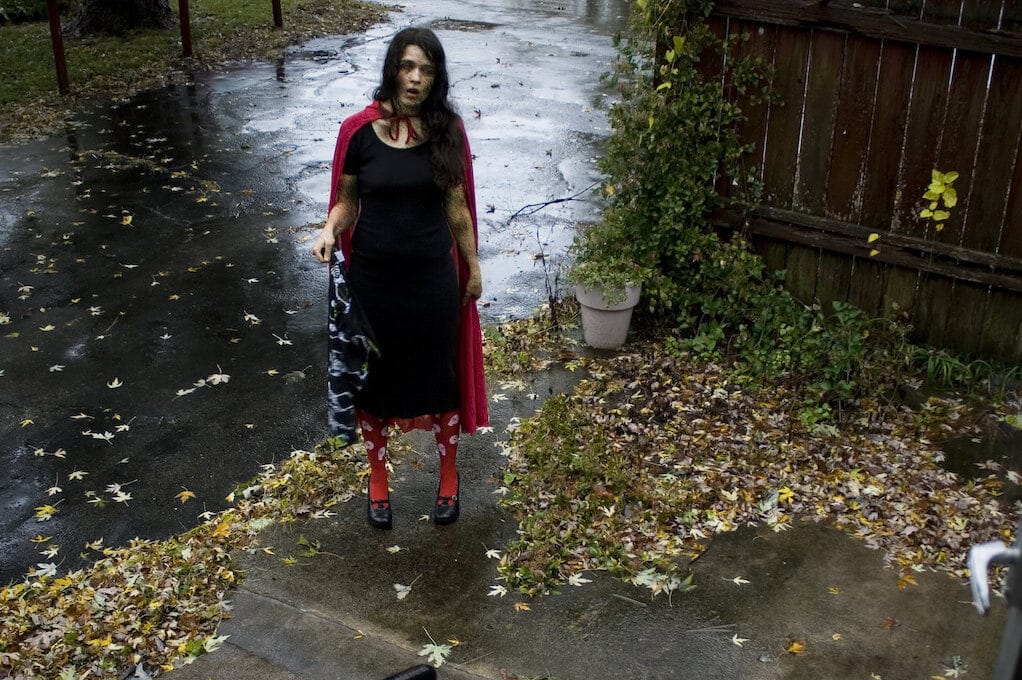“Why do you think we like porches so much?” Ash said, moments before his death.
“Um—the swings and the chairs. And the view,” I said.
Ash stared blankly forward. “No.”
They started coming around midnight the night before, The Feeders did. That’s what they were calling them on the news and on the radio all morning. We had heard them lurking around in the darkness outside our apartment and in the street while we tried to sleep—their licking and chomping and salivating over their meals, it was all so much louder than you’d think.
“That’s not it,” Ash said.
“Well, I also think it could be the conversation, you know. The community we feel when we sit together out here. Humans love to feel like they fit in.”
Ash shook his head. “The first day of the semester, Jack, when we moved into this craphole, what’d we do? Well, I’ll tell you. We picked up the wicker chairs from your mom’s house, got some beer, and we came out here to the porch. Why? What’s so special about it that we don’t just sit in the living room, where it’s air-conditioned? We could talk in there, feel all connected and a part of society, like we’re not all alone, just the same as we do out here, couldn’t we?”
“I guess,” I said.
There was a cat or a squirrel or a rabbit being torn apart in the alley separating our apartment-style house from the one to our right that looked just like it. The distinct sound of fur-covered flesh being ripped from bone.
“‘Nother cat,” I said.
Ash grunted in agreement, then said, “But it’s not just America. They have them everywhere, in every country. Humanity in general is obsessed with porches. Freakin’ obsessed.”
“Well, what, do you want to go inside?” I asked, grabbing another beer from the six-pack sitting between us and opening it with a keychain bottle opener.
“No, no. I’m just saying I don’t get it.”
The radio played from inside our half of the house, loud enough so we could hear it through the closed storm door. News. That’s all any station had played since 1 AM, and the man on 98.6 The Beat was now reading names of towns in monotonous, bland tones followed by numbers. We were expected to know what it meant, like it was some kind of universal understanding, these towns and numbers paired together.
“Smyrna, sixty-two. Spring Hill, eighteen. Murfreesboro, one hundred and twelve. Nashville, eight hundred and sixty-two—”
“Ten more this hour,” I said.
“Yeah.”
“What if it has to do with comfort?” I said, kicking my feet up onto the white porch railing.
“We’ve gotten word that The Feeders are in fact affected by pepper spray,” the voice from inside the house said after he finished reading the hourly death numbers. “But only in large doses, and only when taken directly into the eyes. We ask that you—”
Ash sighed. “Comfort, Jack? Really? Comfort? The couch inside is a hundred times more comfortable than—”
“Not what I mean, Ash. Listen. What do you hear?”
A soft hum had started from around the corner of the house. The sort of hum that comes from deep inside a throat—originating from even further down, somewhere in the diaphragm—and gargles sporadically as it leaves the mouth. The Feeder in the alley had made its way to the opening beside our house and now stood to our right and a little bit behind us, in the small patch of grass we called our yard.
Something reeked.
We could see it clearly in the sunlight, although, according to the man on The Beat, The Feeders were supposed to prefer darkness, and they rarely strolled around in wide open spaces. I realized as it emerged from the shaded alley next to our apartment that it was the closest we’d been to one. I could see its eyes now, much smaller than the picture in The Tennessean let on.
“Ash, what do you hear?” I repeated.
“I hear The Feeder,” Ash said. “The one from the alley, the one we heard eating the cat.”
“That’s right,” I said, “but why aren’t we running?”
“Because the house is right here.” He pointed. “We could be inside with both doors bolted shut in ten seconds flat.”
He was right. We could.
Earlier that morning, the man on The Beat had told us nearly everything we needed to know about those tall, lanky, humany creatures from hell—the ones that took over for an entire summer when we declared war on overpopulation. He told us their skin was made of a rubbery material that couldn’t be pierced by any small blades, pocket knives, etc.; that they preferred cats, but they were designed to prefer us (someone lost their job over that one); that they would finish a meal completely, ingesting even the bones, before moving on to the next.
But, no, he didn’t mention the jumping. He forgot to say that they could leap over twenty-five feet from a standstill position and latch onto your neck; he didn’t say that they could do all of this in far less than ten seconds. He didn’t tell us that. He didn’t tell us everything we needed to know.
“Comfort,” I said. “The illusion of safety while experiencing the wild. That’s why we like porches. Comfort.”
“Hmm,” Ash said, standing and walking over to the porch railing. “No. That’s not it either.”
–
Jordan Brunelle is studying English in Nashville, TN. He likes to be outdoors and eat Everything bagels. He has a cat and a dog. No girlfriend.
Lead image: “Untitled” (via Flickr user rachelakelso)


amazing ending!
Reblogged this on Weekly Flash Fiction.